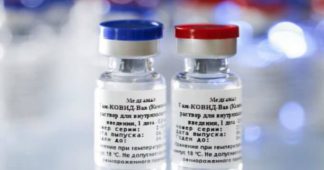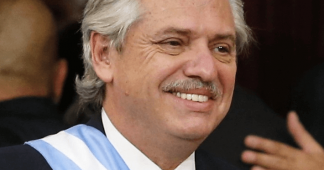Reacting to Mitsotakis’ declaration that Russia is not in position to deliver vaccines to Greece (as described in the following article), Moscow has stated it can provide Greece with 500.000 doses of its Sputnik vaccine during May.
Greek politicians bicker over Russia’s Sputnik V vaccine
By Sarantis Michalopoulos
Apr.6, 2021
Languages: Français | Deutsch
Greek Prime Minister Kyriakos Mitsotakis has clashed with opposition leader Alex Tsipras over whether the country should order Russia’s Sputnik V vaccine outside of the European Union’s vaccine framework.
Tsipras, the leader of the main opposition Syriza party (European Left), called on the conservative Mitsotakis (European People’s Party) to follow the example of other EU member states and order Russia’s Sputnik V vaccine.
The slow vaccination roll-out across Europe due to the delayed deliveries of British-Swedish AstraZeneca’s vaccine has caused political turmoil in many EU capitals.
Despite a strict lockdown in place for months, Greece has seen a sharp increase in COVID-19 cases. Just on Monday (5 April), the country recorded 1,866 new cases and 73 deaths, while 759 people are currently intubated, with the public health system reaching its limits.
The Greek prime minister reacted negatively to Tsipras’ suggestion, opposing any purchase negotiation outside of the EU framework. He also added that there are no vaccines available from Russia.
“Even if we wanted vaccines from Russia and took the risk to bypass the European process, there are not enough,” Mitsotakis said.
Tsipras replied that other countries such as Germany and Austria are already in talks with Moscow to pre-order the vaccine in anticipation of it being approved by the European Medicines Agency (EMA).
Sputnik V is under EMA’s rolling review but no official request for market authorisation has been made so far.
In order for the European Commission to start negotiations to order a vaccine, at least four member states are needed to make a request.
No member state has so far made such a request but instead, some EU leaders have preferred to negotiate directly with Moscow.
German Chancellor Angela Merkel’s chief spokesman Steffen Seibert recently said Berlin was open to buying the Russian jab unilaterally in case other EU partners were not interested.
Moreover, Merkel and French President Emmanuel Macron held a teleconference last week with Russian President Vladimir Putin during which the possibility of registering Sputnik V in the EU as well as the prospect of joint production in EU nations was raised, according to Moscow.
Mitsotakis also accused Tsipras of trying to cause a government crisis similar to the one in Slovakia which resulted in the resignation of Slovak Premier Igor Matovič.
The coalition crisis in Bratislava started in early March after Matovič agreed to buy 2 million Sputnik V doses from Russia without the coalition’s permission.
Hungary and the Czech Republic have made similar moves.
Despite the delays in vaccines deliveries, the EU insists that it can still vaccinate 70% of the adult population by September with the already approved vaccines.
The bloc has put high hopes for the second quarter of the year, as it expects approximately 420 million doses including 55 million one-shot jabs of Johnson & Johnson. For the second quarter, AstraZeneca has vowed to deliver 70 million doses.
[Edited by Josie Le Blond]
Published at www.euractiv.com











